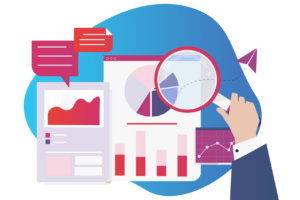Practice what you Breach:
How Data Governance can help you be more cybersecure.

Written by: Roxana Lemaire
“Data is the pollution problem of the information age, and protecting privacy is the environmental challenge” (Schneier, n.d.).
Just like our environment is threatened by pollution, personal data is jeopardising our security. It’s important to manage data efficiently and in a secure way so that its confidentiality, integrity, and availability is safeguarded. This means that threats and vulnerabilities can be avoided, and in case of a breach, most of the data can be recovered.
With October being Cybersecurity Awareness Month, it is the perfect time to shed some light on how data governance can be used to improve the overall security of all valuable data within your organisation.
What are Data Governance, Cybersecurity and Data Protection?
Data Governance involves managing processes and agreements regarding data within the organisation. It covers the responsibility and role of employees regarding the data they are processing. Whether they are in HR, Marketing, or Sales: each department has its own responsibilities.
In short, data governance manages the confidentiality, integrity, and availability, but also the security and usability of data.
Cybersecurity on the other hand is all about the protection of data: ensuring that no unauthorised person has access to them and that they don’t leave the organisation unwontedly. Again, the integrity and availability, as well as the confidentiality of the data are managed.
Still, one has to keep in mind that cybersecurity is not a purely technical matter. Even if you’re not an expert, it is possible to mitigate vulnerabilities and risks just by taking a few simple measures. Of course, a number of technical measures need to be taken in addition, like using a paper shredder or keeping files in a closed cabinet.
Onto the last one then: data protection. Data protection is the process of safeguarding data from loss or corruption, and ensuring it is used properly and fairly. Although the notion is used interchangeably with privacy, there is a difference. Explained simply, protection is more focused on technological aspects, whereas privacy focuses more on the legal side. In any case, both are necessary within the organisation.
See how these three overlap?
Relationship Between Data Governance, Cybersecurity, and Data Protection.
For one, data governance allows organisations to make decisions on how data are processed, where they are stored, and how employees need to handle them. Additionally, it defines, approves, communicates, and implements policies, principles, procedures, tools, and responsibilities for data management. Finally, data governance is used to monitor and guide policy compliance and data usage.
But then, what is the main purpose of cybersecurity? Cybersecurity is all about protecting valuable information from being stolen or compromised. It has the following three fundamental goals concerning data, also known as the CIA:
- Secure data Confidentiality;
- Maintain data Integrity;
- Availability of the data
Of course, data also need to be protected, which is where Data Protection comes in. This process, regulated by the GDPR in the EU, is all about controlling how personal data is collected, stored, and used, as well as protecting it from corruption, compromise, or loss, as regulated by art. 32 GDPR.
So, what is the connection? Data governance helps organisations to identify the data classification, which can conclude (sensitive) personal data. It helps to understand and be compliant with regulations and policies concerning privacy and other legislations, as well as protecting the data from unauthorised access, thus ensuring its confidentiality, integrity, and availability.
As a result, all three have a common ground: data. First, data management focuses on managing an organisation’s data. Security, then, is about protecting that data, and finally, privacy is about a specific subset of that (personal) data.
Data Governance in Cybersecurity.
There are five methods and means for data governance to help the organisation, combined with cybersecurity:
- Maintaining regulatory compliance when it is crucial
Organisations have a legal obligation to comply with the GDPR. It is important to maintain this compliance and regularly check whether this is still the case. In this case, data governance helps to classify and monitor the data, as well as define who has access to all data within the company. Cybersecurity then ensures the protection of that data.
- Improving risk identification
Once the risk has been identified, data governance provides an overview of high-risk data and helps to prioritise them, so that protective measures can be taken.
- Enhancing data quality
The purpose of data governance is to ensure that data is managed correctly, and that it is handled in accordance with the organisation’s policies. As security ensures confidentiality, integrity and availability; data governance measures and controls whether it is correct and complete.
All in all, it simplifies data protection by preventing unauthorised access, as well as ensuring the confidentiality and privacy of the data subjects.
- Reducing costs
Thanks to the efficiency within the company, costs are automatically reduced because less time is spent on fixing inconsistencies in data and improving the existing processes. Additionally, by being compliant, organisations can avoid GDPR fines.
- Keeping data governance an ongoing priority
With technology, and its risks concerning data, constantly evolving, the need for data governance also rises. The process should be a part of the organisation so that compliance is easily met in the future, and adjustments take less effort to implement.
All of the above will help to win the trust of (potential) clients, which is a win for any organisation.
So… Remember that quote from the beginning – “Protecting privacy by solving the pollution of data” ?
If we imagine unauthorised people are the pollution, data governance can be used to solve that problem, as it protects the data, and improves cybersecurity.

Hi! How can we help?
Questions, remarks, feedback or compliments? The fastest way to reach us is through the form below.
[contact-form-7 id=”3″ title=”Contact form 1″]
For urgent matters, you can contact us via 02 310 39 63.

